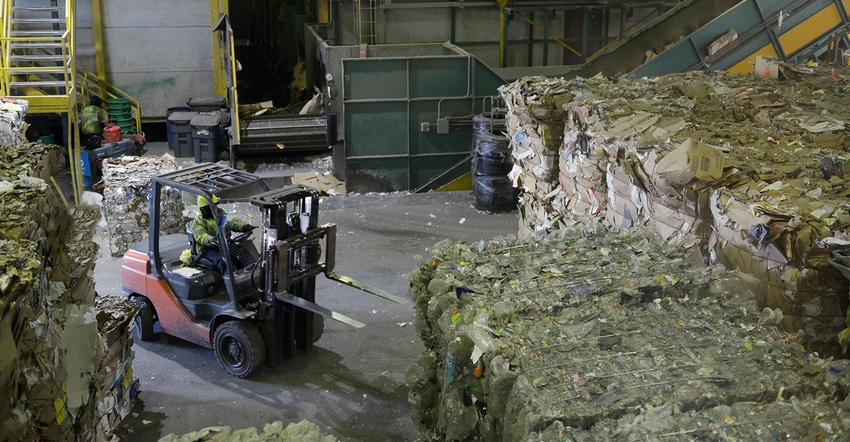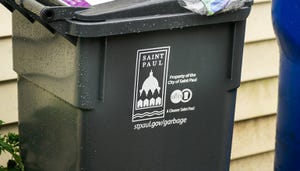Recycling Markets Trend Up, Down and Sideways: A Year in Review and What's in Store for 2024
Markets have been quite quirky this year as I noted in my last column. Paper prices continue to go up in most parts of the country. Even though plastic prices are showing some signs of life, the four curbside plastics, PET, both HDPEs and polypropylene, remain in the doldrums. Recycling prices normally weaken in winter s demand slows down. As with most recyclers, I remain cautiously optimistic markets will improve in 2024 but all too aware the economy is full of uncertainties.

2023 has been an up, down and sideways year for recycling. Let’s take a look at what happened in a few key areas.
Markets have been quite quirky this year as I noted in my last column. Paper prices continue to go up in most parts of the country. Even though plastic prices are showing some signs of life, the four curbside plastics, PET, both HDPEs and polypropylene, remain in the doldrums. Recycling prices normally weaken in winter's demand slows down. As with most recyclers, I remain cautiously optimistic markets will improve in 2024 but all too aware the economy is full of uncertainties.
2023 did not provide the legislative victories anticipated by packaging EPR advocates. In 2022, four states enacted the first of these laws in the U.S. In 2023, state legislators seem to have realized EPR’s complexity. They decided to wait and see how those laws work. Perhaps that makes more sense than diving into untested waters.
My home state of Maryland was one of these states. As the representative of the Maryland Recycling Network, I testified in favor of the original EPR packaging bill in both legislative houses. It was a good bill that would have helped finance local collection programs and MRFs (Maryland’s three largest counties each own a MRF).
The Senate passed its bill but the House wasn’t ready to move. Instead, the two bodies agreed on doing to a needs assessment of our recycling programs and infrastructure. Those results will be used to draft an EPR law that will undoubtedly pass. This is a logical approach. First figure out the problem and your existing resources, then solve that problem, not another one.
Anti-plastic crusaders had another year of negative impact on recycling. They use incorrect recycling figures and fail to put them into any context to “prove” plastic products aren’t recycled. They have convinced many Americans that recycling is a scam. Their efforts have harmed good recycling programs and undoubtedly convinced many people not to “waste” time on recycling. Yet if plastic recycling is a fraud, why did 2700 people and 220 exhibitors attend this year’s plastic recycling conference?
Another trend caused by the hue and cry against plastics is a movement to switch from plastic packaging to paper. Delta Airlines recently announced it will be using paper cups for all liquids served in flight. Delta claims the cups can be recycled where “airport recycling facilities are in place.”
Delta boasts it is eliminating seven million pounds of plastics from disposal. Paper cups are heavier than plastic. I’ve heard a number of estimates of their weight, but let’s assume they are only two or three times as heavy. That’s more going to landfill not less. As for recycling the cups, I doubt flight attendants will have the time to remove liquid and other contaminants and stack the cups neatly. Nor will many MRFs will be interested in trying to sort and clean them.
Organics continue to receive a great deal of attention. The biggest opportunity for decreasing waste is transforming food waste into resources. It’s also the hardest challenge for people to do correctly. While food waste seems easy enough to define, composting facility operators will point out the obviously non-food stuff people put in their organics bin.
That leads to a particularly hard problem for recycling. We Americans tell pollsters we want to recycle. By our actions, we indicate we have other priorities. At least a fourth of us just don’t care and many others seem to need constant handholding. Recycling advocates need to get real about achievable targets whether they are for recycling, recycled content or food recovery. Unfortunately, recycling legislation is littered with failed targets. Policy must be translated into requirements and goals that work in reality not just in theory.
Finally, three words, “lithium-ion batteries”. These little darlings are found in all kinds of products such as e-bikes, electric toothbrushes, tablets, cell phones and a host of other commonly used products. If they hit a piece of MRF recycling equipment, a fire can start. One such fire burned down a brand new facility. Lithium-ion batteries may be the most serious problem facing recycling. All the education and enforcement go for naught if the MRF burns down.
So there you have it. Markets will improve in the long run, even if they continue to stumble and stutter. My home state will pass a great EPR packaging law in about two years. The anti-plastic crusaders will continue to do everything they can to say recycling is a failure. We will eventually see a decline in interest in the plastic to paper conversions, largely for cost and greenhouse gas emission reasons. Will all of us learn to recycle right, including organics, and do it enthusiastically? No. Convenience is deeply engrained in human behavior.
But of one thing, I am certain. Sorting technologies will continue to improve in leaps and bounds. We are slowly starting to diminish the human factor. Now, if can just do something about those lithium-ion batteries.
About the Author(s)
You May Also Like




